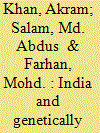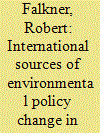| Srl | Item |
| 1 |
ID:
176086


|
|
|
|
|
| Summary/Abstract |
In spite of impressive efforts from public and private organizations over the last 25 years, agricultural biotechnology has gained relatively little ground in Africa. Using ethnographic research and case studies from across the continent, we argue that a complex choreography of socio-political, regulatory, and business conditions is required for agricultural biotechnology projects to ‘succeed’ in Africa. While this choreography is rarely achieved, efforts to bring agricultural biotechnology to the continent have resulted in significant reconfigurations of political, legal, and media landscapes in many African countries. These shifts cry out for more scholarly attention, which we attempt to give here.
|
|
|
|
|
|
|
|
|
|
|
|
|
|
|
|
| 2 |
ID:
113836


|
|
|
|
|
| Publication |
2012.
|
| Summary/Abstract |
This article analyzes how exchange participants in university-industry agricultural biotechnology research collaborations manage and create differences between the academy and industry with regard to the open dissemination and commercialization of scientific knowledge. Our focus is on the constitutive relations that define the boundary between academic and commercial science. We identify a particular "relational package" that formalizes and standardizes exchanges of money from industry for privileged access to university research discoveries. Our analysis of academic scientists' justificatory narratives about their patenting decisions challenges the oft-made assertion that academic patenting on its face should be taken as evidence of a blurred institutional boundary between academic and commercial science.
|
|
|
|
|
|
|
|
|
|
|
|
|
|
|
|
| 3 |
ID:
162048


|
|
|
| 4 |
ID:
140129


|
|
|
|
|
| Summary/Abstract |
Given the high level of poverty, malnutrition and hunger and the low level of agricultural productivity in India, agricultural biotechnology has great potential. To feed a billion-plus population by relying on conventional methods of cultivation is next to impossible. India is rich in bio-resources and biotechnology offers opportunities for converting biological wealth into economic wealth, thereby creating new employment opportunities on an environmentally and socially sustainable basis. Biotech crops have been cultivated globally for the past two decades with no negative impact on human beings, animals and the environment. The success of Bt cotton in India in the 2000s has set an excellent example of how genetically modified (GM) technology can turn around India’s agriculture sector. Safety of GM crops being a serious issue, it is important to ensure that India has adequate regulatory instruments and infrastructures. At the same time, India has more serious food safety risks to worry about including unsanitary food processing, as well as food security concerns pertaining to the availability and affordability of food. Priority must go to more clearly demonstrated safety risks instead of hypothetical risks.
|
|
|
|
|
|
|
|
|
|
|
|
|
|
|
|
| 5 |
ID:
076348


|
|
|
|
|
| Publication |
2006.
|
| Summary/Abstract |
China's agricultural biotechnology policy has undergone a profound transformation over the last decade, from a strongly promotional to a more precautionary approach. From the 1980s onwards, China invested heavily in biotechnology development and in the early 1990s emerged as the leading biotech country in the developing world. In the late 1990s, however, it halted the authorization of new genetically modified crops and introduced stringent safety regulations. This paper investigates this policy shift and argues that international factors have played a central role. Two trends, in particular, are identified as key sources of the move towards greater precaution: China's ongoing international socialization, particularly in the context of the international scientific debate on biosafety and the negotiations on a biosafety treaty; and the growing globalization of agriculture and trade, which has exposed China to international competitive forces and trade restrictions in food trade. As the case of genetically modified food in China shows, political integration and economic globalization can work together to promote a strengthening of the domestic environmental policy agenda.
|
|
|
|
|
|
|
|
|
|
|
|
|
|
|
|